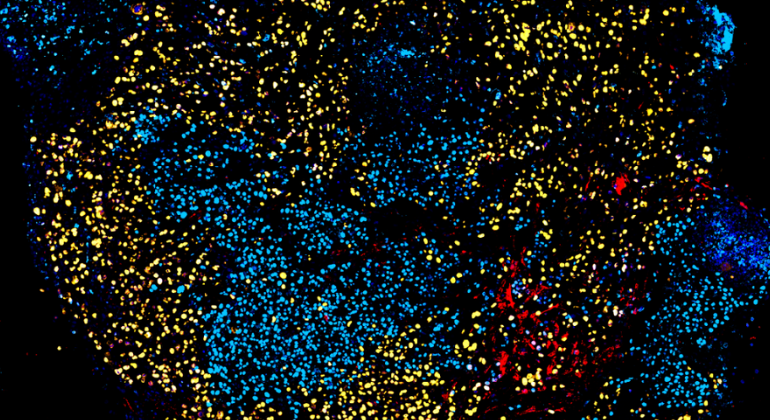Newly Discovered Gut Protist Protects Mice from Bacterial Infections
While bacteria are often stars of the gut microbiome, emerging research depicts a more complex picture, where microorganisms from different kingdoms of life are actively working together or fighting against one another. In a study published October 6 in Cell, scientists reveal one example: a newly discovered protist that protects its host mice from intestinal bacterial infections.
“This was a serendipitous finding, but an important one,” says senior author Miriam Merad, a Professor of Oncological Sciences and of Medicine at the Icahn School of Medicine at Mount Sinai. “This study shows how vital it is to go beyond bacteria when studying the microbiome.”
The investigators made the discovery when they realized that mice that had been bred at their own facility had a greater number of immune cells in the gut than mice purchased from an outside vendor. Graduate student Aleksey Chudnovskiy, the study’s first author, together with postdoctoral fellow Arthur Mortha, decided to figure out why that was the case. When they performed an intestinal cleanse on the two groups of mice, they were surprised to find that the mice from the Mount Sinai facility had flagellated protozoa living in their guts. DNA sequencing revealed that the microorganism was a new protozoan parasite, which they named Tritrichomonas musculis (T. mu).
Further investigations showed that when this protist was given to the mice that didn’t have it, they, too, had an increase in the number of immune cells in their guts and also increased inflammatory cytokines. The researchers set out to discover the underlying mechanism. They found that T. mu activates the inflammasome in the gut epithelial cells of the mice, which in turn led to the activation of cytokines. They also found that dendritic cells were required to induce inflammation.
To determine whether colonization of T. mu in the gut affected the mice’s ability to fight off infection, they infected mice with Salmonella and found that the animals that had T. mu as part of their microbiome were very resistant to Salmonella infection. “The protective effect of this species is very striking,” Chudnovskiy says.
T. mu was found to be an ortholog of Dientamoeba fragilis, a parasite that’s found in the guts of many humans, but the researchers don’t know if D. fragilis also has a protective effect. It’s something they plan to study. “People from industrialized countries traveling to emerging countries are more susceptible to intestinal infection than the indigenous population,” Merad explains. “It’s possible that protists, which are known to be common in emerging countries, contribute to the protective effect against intestinal pathogenic infections.”
She adds: “The fight against pathogens determined the survival of the human species, and those with stronger immune systems are the ones who survived. It is likely that the microbiome is a big part of the evolutionary process. Thus, identifying those commensals that confer immune strength in exposed communities should help identify novel therapeutics.”
This research was funded by the National Institutes of Health and supported in part by the National Institute of Allergy and Infectious Diseases.
Cell, Chudnovskiy et al: “Host-protozoan interactions protect from mucosal infections through activation of the inflammasome” http://www.cell.com/cell/fulltext/S0092-8674(16)31174-6 / 10.1016/j.cell.2016.08.076
About Cell
Cell (@CellCellPress), the flagship journal of Cell Press, is a bimonthly journal that publishes findings of unusual significance in any area of experimental biology, including but not limited to cell biology, molecular biology, neuroscience, immunology, virology and microbiology, cancer, human genetics, systems biology, signaling, and disease mechanisms and therapeutics. Visit: http://www.cell.com/cell. To receive Cell Press media alerts, contact press@cell.com.
About the Mount Sinai Health System
Mount Sinai Health System is one of the largest academic medical systems in the New York metro area, employing 48,000 people across its hospitals and more than 400 outpatient practices, as well as more than 600 research and clinical labs, a school of nursing, and a leading school of medicine and graduate education. Mount Sinai advances health for all people, everywhere, by taking on the most complex health care challenges of our time—discovering and applying new scientific learning and knowledge; developing safer, more effective treatments; educating the next generation of medical leaders and innovators; and supporting local communities by delivering high-quality care to all who need it.
Through the integration of its hospitals, labs, and schools, Mount Sinai offers comprehensive health care solutions from birth through geriatrics, leveraging innovative approaches such as artificial intelligence and informatics while keeping patients’ medical and emotional needs at the center of all treatment. The Health System includes approximately 9,000 primary and specialty care physicians and 11 free-standing joint-venture centers throughout the five boroughs of New York City, Westchester, Long Island, and Florida. Hospitals within the System are consistently ranked by Newsweek’s® “The World’s Best Smart Hospitals, Best in State Hospitals, World Best Hospitals and Best Specialty Hospitals” and by U.S. News & World Report's® “Best Hospitals” and “Best Children’s Hospitals.” The Mount Sinai Hospital is on the U.S. News & World Report® “Best Hospitals” Honor Roll for 2024-2025.
For more information, visit https://www.mountsinai.org or find Mount Sinai on Facebook, Twitter and YouTube.
Researchers Discover Potential Boost to Immunotherapy
Mar 30, 2020 View All Press Releases
